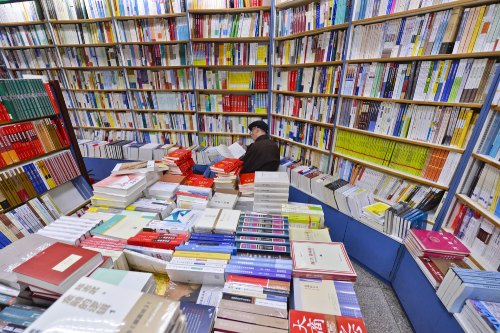Reading in China, as a habit, a lifestyle and a fashion

One year after opening Beijing's first 24-hour bookshop, Sanlian Taofen Bookstore (STB) opened a new branch in Beijing on April 23, World Book Day.
Started in 1996, STB eventually cemented itself as one of Beijing's cultural landmarks. When the company announced their bold round-the-clock retail plan in Beijing, few people saw the hope for success against the backdrop of Beijing's other bookshops closing down one after another with the arrival of increasingly popular e-book services. However, STB has gone on to prove even its harshest naysayers wrong.
"At first, we thought that as long as we could keep the business running, it didn't matter if it was profitable or not," said Zhang Zuozhen, General Manager of STB. But the first year ended up seeing a 58-percent increase in sales and a 111-percent increase in profits, leading to STB deciding to branch out.
Zhang expressed his confidence in the newly opened branch, located at Wudaokou in Beijing's north, a bustling area located near multiple universities, including prestigious Peking University and Tsinghua University.
Like the main store of STB, the new branch offers café service and holds reading salons frequently. The book selection in the new branch targets young and middle-aged readers.
"I am very excited that STB has opened a branch here," said Zhou Liangliang, a sophomore student from Tsinghua University. "I always wanted to go to STB main store at night, but it was a bit far away for us, now it is very convenient and it is like we have another off-campus library that is open around the clock."
Dropped book consumption

The 2014 and 2015 government work reports of China highlighted the need to promote reading nationwide, and encouraged it through favorable taxation policies and funding supports that have been implemented to help the country's bookstores.
"We will ensure that more outstanding works of literature and art are created for the people to enjoy, and encourage a love of reading in all our people to build a nation of avid readers," Premier Li Keqiang said in his government work report released on March 17.
Zhang said that STB broke the ice of 24-hour service in Beijing in 2014 with the government fund that exceeded 1 million yuan ($161,290).
Unavoidably, traditional bookstores have faced harsh competition from the e-book market. According to figures from STB, 10 years ago, the annual sales volume of Sanlian was around 25 million yuan ($4.03 million), while in 2011, the number dropped to 10 million yuan ($1.61 million).
According to a survey released by the Chinese Academy of Press and Publication (CAPP) on April 20, Chinese people read 4.56 books per capita in 2014, 0.21 less than the previous year, but the number of e-books read averagely is 3.22, 0.74 more than that of 2013.
"The number of books doesn't mean that much," said Zheng Yefu, a sociology professor at Peking University. "It is the quality, not quantity, that matters."
Zheng went on to quote Confucius: "Learning without thought is labor lost; thought without learning is perilous." Zheng followed up by musing that choosing a good book is the first step and a good book should be the one that helps you to ponder something in a more thorough and deep way and view the world from different perspectives. "But among the millions of books published every year in China, most of them are just rubbish," said Zheng.
"It's rare for me to go to bookshops now as I can't find what I want to read. Many of the books are written in the same style and have the same content, such as advice on how to rich and successful," said Chi Li, a 57-year-old writer. "We should ensure that more outstanding works of literature and art are created for the people to enjoy, and encourage a love of reading in all our people to build a nation of avid readers."
Although the importance of reading has been highlighted in the government report for two years in a row, Chi still remains concerned about the types of books people read. Though several local governments have invested money in building libraries, "It doesn't mean residents enjoy real reading," said Chi. "They hardly carried out any research before setting up libraries and had no idea about what books the readers in their regions like or need."
"People need to be guided to read high-quality books," said Zheng. "Some people don't like reading because during primary and middle school, students are limited to textbooks or reference books that are targeted only at getting high scores in exams. For them, reading reminds them of these books that they were hardly able to enjoy."
This phenomenon is also evident among the students at Peking University. Zheng always recommends a list of books to the students at the beginning of a semester but finds that almost nobody takes the list seriously.
"If you ask them whether they like reading, they might say yes, but what they read might be just random e-books they get online. Reading is a serious process, you need to digest what you read. Only good books are worth the process," said Zheng.
















































